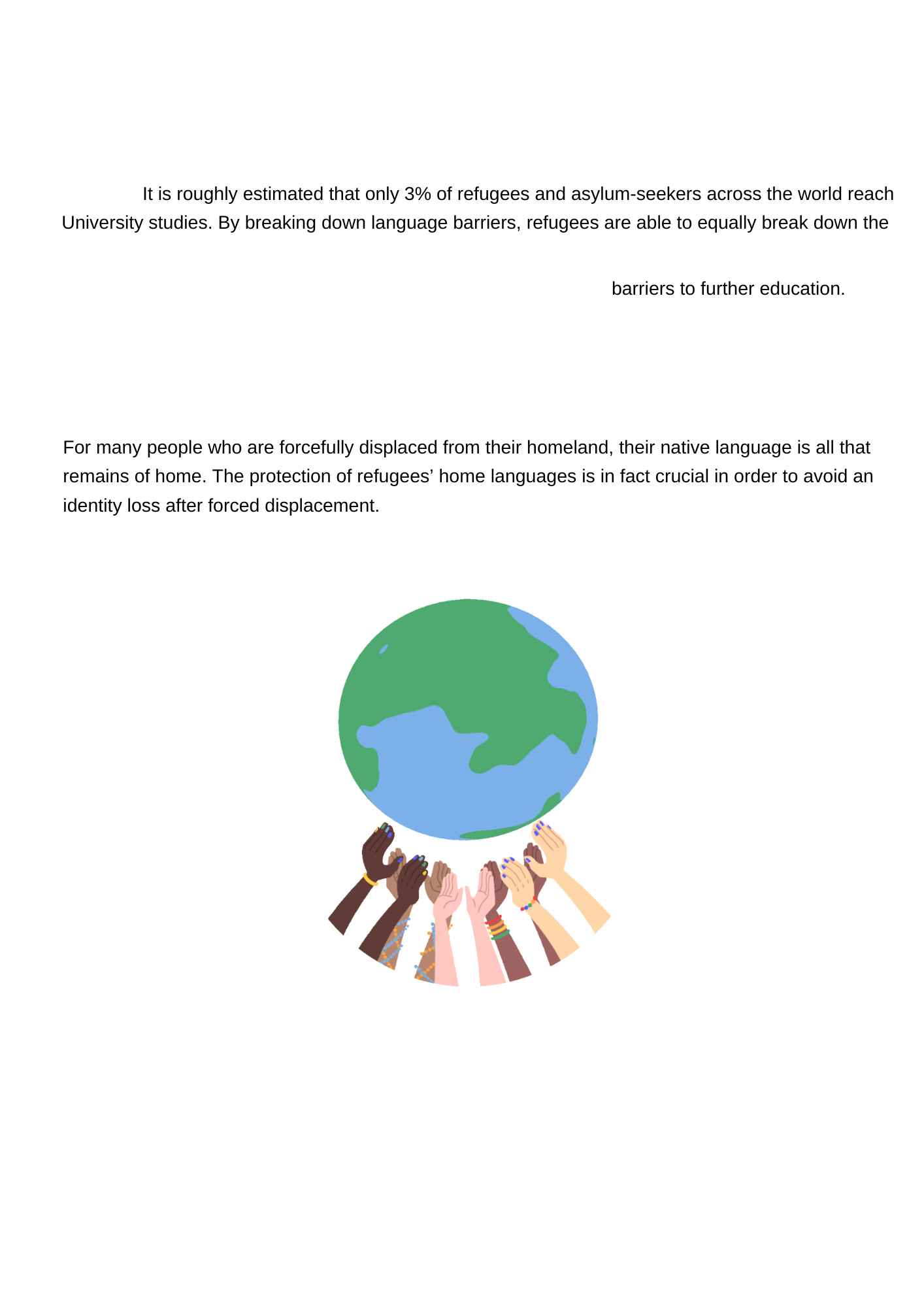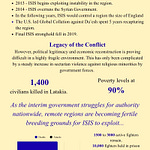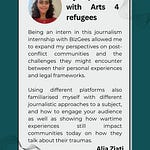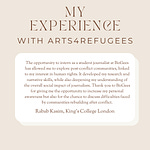Barriers after Borders: The impact of language learning on refugee experience
Language is the foundation of all human connections, and it plays an essential role in helping us possess all seven of our fundamental human needs.
It would be simply impossible for anyone to feel truly understood, accepted, and connected with others if we are incapable of communicating with those who surround us.
The UK government considers English proficiency as highly important for the integration of refugees and immigrants, as it not only aids them to access education, employment, and medical assistance, but it equally allows them to experience a sense of belonging and closeness to their new community.
Rebuilding one’s life in a foreign country involves a variety of difficulties and hardships, even without the presence of a language barrier. Needless to state that to set up an entirely new life in an entirely new language is even more arduous.
The UK public, as well as refugees living in the UK, believe that English proficiency is more than beneficial for the integration of refugees. Nonetheless, there is a major lacuna in the language learning opportunities offered to those who arrive in the UK in the hope of a better future. The benefits that arise from English proficiency are countless, and many studies and research have shown the first-hand impact it has on refugee experiences.
One of the most straight-forward benefits include applications for settlement status (right to live in the UK indefinitely) and/or British citizenship, as both require a B1-level qualification.
Language learning programmes
So, what are the available programmes for English learning?
In the UK, ESOL courses are offered by the government free of charge for asylum seekers who have been given resettled status and are not receiving benefits or financial support. These courses are eight hours a week during the first year in the UK.
After the first year, the courses are cut to four hours a week once you are eligible to claim jobseeker’s allowance. However, if refugees are claiming other forms of benefits (‘non-active benefits’), they are no longer eligible for funding for ESOL.
In 2022 and 2023, around 150,000 ESOL places were funded by the British government. This reached the highest number seen in the past decade, principally due to an increase in demands. ESOL stands for English for Speakers of Other Languages, and although these courses are not solely designed for refugees, they play a significant role in helping refugees build their new life. By allowing even basic communication, a cascade of opportunities is brought about.
Joel Bubbers, Director of British Council, stresses the importance of funding language learning programmes for refugees:
“Education has a critical role to play in giving social and economic opportunities (...). However, only a small proportion of the money directed towards alleviating the crisis is currently being spent on education.”
There are many other language learning programmes offered to refugees, these being either private tuitions or non-profit teaching. The British Council also offers some free self-study courses available online.
Employment
In 2021, The Migration Observatory at the University of Oxford showed how people who could not speak English well or at all had much more difficulty in finding employment.
The Migration Observatory analysis of the 2021 England and Wales Census showed that 69% of migrants who spoke English very well or well were employed, compared to 50% of those who could not speak English well or at all.
Although this difference does not appear to be colossal, when comparing the percentage of inactive people between these two categories, 15% versus 41% respectively, it becomes clear that language learning has a direct impact on refugees’ employment rates.
Language proficiency not only makes refugees more employable and economically self-sufficient, but it also allows them to avoid injustice and mistreatment in the workplace.
Education
In 2016, during the Syrian refugee crisis, the British Council conducted a research project on the relevance of language learning for Syrian refugees as well as the host countries, which was named “Language for Resilience”. Amin Awad, member of the UNHCR Middle East and North Africa Bureau and Regional Refugee Coordinator for Syria and Iraq, stated:
“Language is an equalizer. When a child can speak and write in the host country language they develop the confidence and self-assurance to communicate with their peers, building a solid educational foundation that serves them for the rest of their lives.”
One of the major benefits of language learning is in fact further education. It is roughly estimated that only 3% of refugees and asylum-seekers across the world reach University studies. By breaking down language barriers, refugees are able to equally break down the barriers to further education. In order to do so, teachers and educators must be flexible and be able to adjust to the different abilities of the children who have been forcefully displaced. Equality and equity have two different meanings, and it must be understood that not all students will have similar levels of language proficiency and academic abilities.
UK schools have been advised to work with charities, to prioritise raising awareness on refugee experiences amidst school staff, as well as posing a focus on teaching English through the Arts and physical activities.
Sense of Belonging
Language proficiency and literacy therefore have professional and educational benefits, but they are also fundamental components of human understanding and compassion. Language allows refugees to share and process trauma, loss, and grief, this way allowing them to come to terms with the difficulties and hardship they have faced.
No human being is capable of living a healthy and happy life without processing the trauma they might have experienced, and in order to do so, one must feel and be understood by others.
In a similar manner, language proficiency also aids refugees to break free from cycles of isolation and loneliness, by allowing them to become self-sufficient and integral components of their new community.
It is crucial that refugees not only manage to build a safe space in their host country, but equally feel as if they belong to this new environment. In order for a sense of belonging to exist, refugees must experience freedom, connection, and above all, autonomy. To form meaningful connections with those who surround us, one must feel self-sufficient and autonomous by themselves. Language learning is the first step towards this.
Multilingualism
Language and Identity are intermingled with one another in almost all contexts. Although learning the host country’s language is imperative for refugee integration, there must also be equal significance posed on the preservation of mother tongues. The protection of refugees’ home languages is in fact crucial in order to avoid an identity loss after forced displacement.
For many people who are forcefully displaced from their homeland, their native language is all that remains of home. This is equally relevant for second generation refugees, those born in the UK to refugee parents. Language does not only bring them closer to their ethnic roots but enables them to communicate with their very immediate family if, for example, the parents have a low English proficiency. The transmission of heritage language from refugee parents to their children born in the host country also depends on the parents’ ability to speak the host country’s language.
It is therefore problematic to define the preservation of mother tongues as merely a domestic and/or private phenomenon, for language is complex and it is affected by the outer world and society as well as by the familial and intimate sphere.
In the UK, there is an increasingly present hostility towards foreign languages being widely spoken, making the preservation of refugees’ mother tongues even more arduous.
This is primarily due to the belief that refugees’ mother tongues are a barrier to integration, but this belief has been dismantled and disproved by several forms of evidence. In fact, the preservation of these languages possesses benefits not only for the refugees, but for their new communities as well.
The majority of countries in Europe stress the importance for refugees and migrants to learn the language of the host country, but how feasible is it for refugee children or second-generation refugees to learn both languages?
Only a very small number of countries offer the possibilities for children to study and preserve both languages. One of the major examples is Sweden, where the right to Mother Tongue Tuition is integrated by law.
The Swedish National Agency for Education asserts “A mother tongue is always important, it needs to be used and confirmed throughout life.”.
By offering mother tongue tuition, Swedish schools reinforce the importance of multilingualism. A multitude of research has proved that preserving one’s mother tongue further facilitates the learning of other languages, as well as reinforcing and improving memory, concentration, and attention.
Linguistic abilities are widely flexible and expansive. We can learn one language without letting this impact another, which is deeply meaningful for the refugee experience.
It is not a “either-or '' situation, refugees’ mother tongues should not be seen as less functional or rewarding than the host country’s language. On the very contrary, there should be more focus on making the coexistence of both languages more harmonious.
Thisuri discussed post conflict experiences and issues faced by post-conflict communities. She is a student journalist on a placement organised by Oxford University Career Services. This article was seld-edited.
Thank you for your time. Don’t forget to share A4R 🎨 Media Hub. Every share helps.















